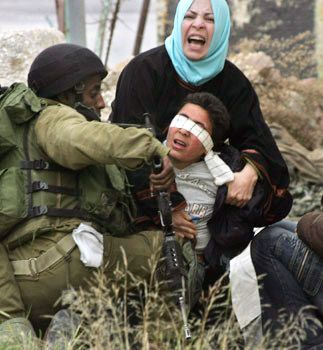
Publisher:
Bonnie King
CONTACT:
Newsroom@Salem-news.com
Advertising:
Adsales@Salem-news.com

~Truth~
~Justice~
~Peace~
TJP
Feb-25-2010 02:18

 TweetFollow @OregonNews
TweetFollow @OregonNews
A Palestinian Arrest so Ridiculous Even the Israeli Judges Smiled
By Amira Hass Special to Salem-News;.com"Is this what the great Israel Defense Forces are needed for – to arrest this boy?" Father of 12-year old boy
 Courtesy: sabbah.biz |
(JERUSALEM) - Something about 12-year-old Bassam caused two Israelis to smile. Two Palestinians noticed, but did not remember their smiles as being disparaging or arrogant. On the contrary. The Palestinians regarded the smiles as a rare moment in which two Israelis – and not just any Israelis, but military judges – realized how ridiculous the situation was.
There were three other Israelis present, who held back their cries as they watched the boy enter, faltering – the chains around his legs clanging against each other, the prisons service coat he wore much too big for him. These three women, of their own accord, go regularly to the caravans that house the Ofer military tribunal and take notes. Were it not for these three women, who eventually shared his story, Bassam would have become yet another hidden detail of a non-event. A non-event of the sort that takes place countless times, all the time. Without those non-events, it is impossible to comprehend what life is like under hostile rule.
This particular non-event began with Bassam (not his real name), who lives in a village west of Ramallah, deciding to visit his aunt who lives in another village 14 kilometers away. It took place in the afternoon hours of Monday, 21 December 2009. Bassam's home is some 10 kilometers north of Route 443 and his aunt's home to the south. A narrow, winding path links the villages located along the way. Bassam took two taxis, then began walking the rest of the way. At the suggestion of another boy he met on the path, he took a shortcut through a valley and headed for the little tunnel that runs below the road which is closed off to Palestinians, but built on their land.
Several hundred meters from the elevated road, some Israel Defense Forces soldiers popped out from in between the olive trees. According to the boy, they called him over, saying "Come, come." "I was afraid and fled," Bassam says. But the soldiers grabbed him. He noticed there were two jeeps nearby.
"They boxed me a little on my ears, covered my eyes and put plastic handcuffs on my wrists. Then they lifted me and threw me into a jeep," he says. An Arabic speaker, he says, told him: "If they ask you, say that you threw stones." "I was so afraid that I did not think about anything," Bassam says two weeks later, at home.
With his eyes covered and hands cuffed, Bassam was taken from place to place. At the first stop, he was kept about two hours. They offered him water, but he said he did not want any. Then they drove to another place where a police interrogator asked him if he "had ever thrown stones on 443," Bassam relates. "I said yes – because that's what the soldier in the jeep told me – but I didn't know what 443 was. He asked me whether I had ever thrown stones with a sling. I asked him what a sling was. He explained to me and I said no."
At the third stop, Bassam was seen by a doctor who spoke some Arabic. "He asked me if I had had any operations and I said no. Then they covered my eyes again, handcuffed me and we went off," he says. By then it was already dark; they next arrived at the Ofer Prison. In the Prison Service records, Bassam is registered as prisoner number 1336183.
The inmates in the cell he was taken to immediately calmed him down, gave him something to eat, and explained that he would appear in court the next day. "I knew about Shabak [the Shin Bet security service] but I didn't know what the court was," he says.
'But I am standing'
At around 3:00 p.m. on 22 December, in the caravan which houses the court, Iyad Misk, an attorney with DCI (Defence for Children International), spotted Bassam, whom he did not know, huddled among the other prisoners. When the judge, Major Shimon Leibo, entered, Misk thought Bassam didn't realize he had to stand. "Get up, get up," he said in a stage whisper from the attorney's stand. Bassam stared at him in amazement. "But I am standing," he said. Judge Leibo heard, looked and began to smile.
Misk immediately volunteered to represent the kid. The prosecutor, police officer Asher Silver, said: "We ask that the suspect be released on condition of a NIS 1,500 deposit and that he be called to a hearing, as we intend to submit an indictment against him."
Misk explained that the suspect did not have NIS 1,500 (approximately one and a half times a Palestinian worker's monthly wage), and that his family members were not present and apparently did not even know where he was. In what sounded like a suppressed reprimand, the judge said that not enough had been done to inform the boy's family about the arrest, and ordered that Bassam be released after NIS 500 was deposited. Misk _ who believed the police should have immediately released the boy the previous day, when the soldiers brought him to the police interrogator – was prepared to pay out of his own pocket, but the offices where the payment was to be made were already shut.
Meanwhile, Bassam's parents were beside themselves with worry. When he did not return home in the morning from his aunt's home, they started searching for him throughout the surrounding areas _ in the orchards, at the checkpoints, on the roads, at army posts. "I walked through the mountains looking for him and crying," his father, who is a welder, recalls. In the evening, one of Misk's friends found the father and informed him that Bassam would be spending a second night in detention. The following day, December 23, the father appeared at the military tribunal.
He held back his tears as he watched his son enter the caravan. The jacket reached his knees and his hands were buried inside the long sleeves. "Take a look at him," the father told the judge, Major Sharon Rivlin-Ahai, in fluent Hebrew. "Is this what the great Israel Defense Forces are needed for – to arrest this boy?"
And then it was time for the second smile – hers this time. The father remembers her saying, "Right." But then she added: "That's the law." She reduced the amount of the deposit to NIS 200, along with a guarantee that his son would appear in court if and when a charge sheet is brought against him. As long as there is no indictment, no one will know what the soldiers who took in Bassam are claiming. It is their word against the word of a Palestinian boy.
Special thanks to: sabbah.biz
============================================
 Amira Hass is a prominent Israeli journalist and author, mostly known for her columns in the daily newspaper Ha'aretz. She is particularly recognized for her reporting on Palestinian affairs in the West Bank and Gaza, where she has also lived for a number of years. The daughter of two Holocaust survivors, Amira was educated at the Hebrew University of Jerusalem. On 20 Oct. the International Women's Media Network rewarded Hass the 2009 Lifetime Achievement Award. Hass was the recipient of the Press Freedom Hero award from the International Press Institute in 2000, the Bruno Kreisky Human Rights Award in 2002, the UNESCO/Guillermo Cano World Press Freedom Prize in 2003, the inaugural award from the Anna Lindh Memorial Fund in 2004 and the Hrant Dink Memorial Award in 2009.
Amira Hass is a prominent Israeli journalist and author, mostly known for her columns in the daily newspaper Ha'aretz. She is particularly recognized for her reporting on Palestinian affairs in the West Bank and Gaza, where she has also lived for a number of years. The daughter of two Holocaust survivors, Amira was educated at the Hebrew University of Jerusalem. On 20 Oct. the International Women's Media Network rewarded Hass the 2009 Lifetime Achievement Award. Hass was the recipient of the Press Freedom Hero award from the International Press Institute in 2000, the Bruno Kreisky Human Rights Award in 2002, the UNESCO/Guillermo Cano World Press Freedom Prize in 2003, the inaugural award from the Anna Lindh Memorial Fund in 2004 and the Hrant Dink Memorial Award in 2009.
Articles for February 24, 2010 | Articles for February 25, 2010 | Articles for February 26, 2010
Quick Links
DINING
Willamette UniversityGoudy Commons Cafe
Dine on the Queen
Willamette Queen Sternwheeler
MUST SEE SALEM
Oregon Capitol ToursCapitol History Gateway
Willamette River Ride
Willamette Queen Sternwheeler
Historic Home Tours:
Deepwood Museum
The Bush House
Gaiety Hollow Garden
AUCTIONS - APPRAISALS
Auction Masters & AppraisalsCONSTRUCTION SERVICES
Roofing and ContractingSheridan, Ore.
ONLINE SHOPPING
Special Occasion DressesAdvertise with Salem-News
Contact:AdSales@Salem-News.com
googlec507860f6901db00.html




Terms of Service | Privacy Policy
All comments and messages are approved by people and self promotional links or unacceptable comments are denied.
Matt K. February 25, 2010 11:30 pm (Pacific time)
It just goes to show that the abuse of authority can become ridiculous no matter where in the world you reside. The men who arrested the boy were most likely doing something wrong themselves or in an area they were not authorized to be in. The best way for them to avoid suspicion being to say they were there to arrest a suspicious person.
gp February 25, 2010 4:06 am (Pacific time)
Over 25 years ago a friend of mine went to Gaza for a year. There she worked with some religious charity. When she returned she told me that most every boy has spent time in Israelis prison, been beaten and often tortured by the age of 16. It seems that now they even arrest children of 12 or younger. Of course, the arresting officers are only 18 themselves oftentimes. See how the old geezers get the young to do their dirty work.
[Return to Top]©2025 Salem-News.com. All opinions expressed in this article are those of the author and do not necessarily reflect those of Salem-News.com.